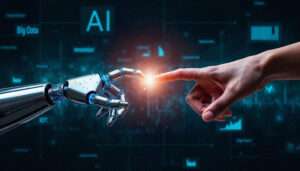
By Jasmin Saidi-Kuehnert, President & CEO, Academic Credentials Evaluation Institute (ACEI)
Artificial intelligence is no longer a distant concept shaping the future; it is reshaping the present, and the world of work is changing at unprecedented speed. From manufacturing floors to medical clinics, and from legal offices to universities, AI is redefining tasks, skill sets, and the very structure of careers. As evaluators of international academic credentials, we at ACEI pay close attention to these developments because the evolution of work has direct implications for how learning is designed, delivered, and recognized across borders.
One of the defining questions raised by thinkers and policymakers is whether AI will ultimately create more jobs than it eliminates. Historically, technology has tended to expand economic opportunity, but today’s AI differs in both scale and scope. It automates not only physical tasks but also cognitive and analytical ones—writing, coding, diagnosing, translating, and synthesizing large amounts of information in seconds. This dual capability means that both blue-collar and white-collar workers will experience significant change.
Yet AI is not simply removing jobs; it is reshaping them. Routine and predictable tasks whether administrative processing or data entry, are increasingly carried out by algorithms. Meanwhile, human roles migrate toward areas where machines remain limited: critical reasoning, ethical decision-making, cultural sensitivity, leadership, creativity, and interpersonal connection. These “human-centric” capabilities will only grow in importance.
This shift underscores the urgent need for rethinking education and reskilling. Lifelong learning will no longer be aspirational; it will be essential. Institutions must adapt curricula to incorporate digital fluency, AI collaboration, and cross-disciplinary problem solving. Credentials, in turn, must evolve to better reflect competencies relevant to an AI-enabled world. For organizations like ACEI, this means staying attuned to emerging qualification frameworks and ensuring that equivalency assessments recognize both traditional academic learning and the new skills demanded by the global workforce.
AI’s impact will not be evenly distributed. Economies with strong technological infrastructure and higher-skilled labor pools may reap significant benefits. Meanwhile, regions with heavier reliance on labor-intensive industries may face accelerated disruption. These disparities highlight the need for coordinated policy interventions: investments in digital infrastructure, equitable access to training, and robust frameworks to protect workers and ensure fairness.
Finally, as AI transforms the structure of work, it also prompts deeper reflections on the purpose of work itself. If automation reduces the need for certain human tasks, how will societies redefine meaning, identity, productivity, and value? Concepts such as universal basic income, reduced working hours, and shared “digital dividends” are entering mainstream conversations.
For ACEI and our global partners, the challenge and opportunity is to help shape a future in which education and credentials support both human potential and technological progress. AI will continue to evolve, but so will we.
References
McKinsey Global Institute. (2025). AI in the Workplace: Empowering People to Unlock AI’s Full Potential at Work.
https://www.mckinsey.com/capabilities/tech-and-ai/our-insights/superagency-in-the-workplace-empowering-people-to-unlock-ais-full-potential-at-work
Swisher, K. (2025). How AI Will Impact the Future of Work [Podcast episode]. On With Kara Swisher.
https://podcasts.apple.com/us/podcast/how-ai-will-impact-the-future-of-work/id1643307527?i=1000732116998
Organisation for Economic Co-operation and Development (OECD). Artificial Intelligence and the Future of Skills (Project).
https://www.oecd.org/en/about/projects/artificial-intelligence-and-future-of-skills.html
#ACEIGlobal #FutureOfWork #AIandEducation #CredentialEvaluation #InternationalEducation #AIinRecognition #WorkforceDevelopment

Jasmin Saidi-Kuehnert, President & CEO

The Academic Credentials Evaluation Institute, Inc. (ACEI), was founded in 1994 and is based in Los Angeles, CA, USA. ACEI is a full-service company providing complete and integrated services in the areas of international education research, credential evaluation, training and consultancy. https://acei-global.org/
